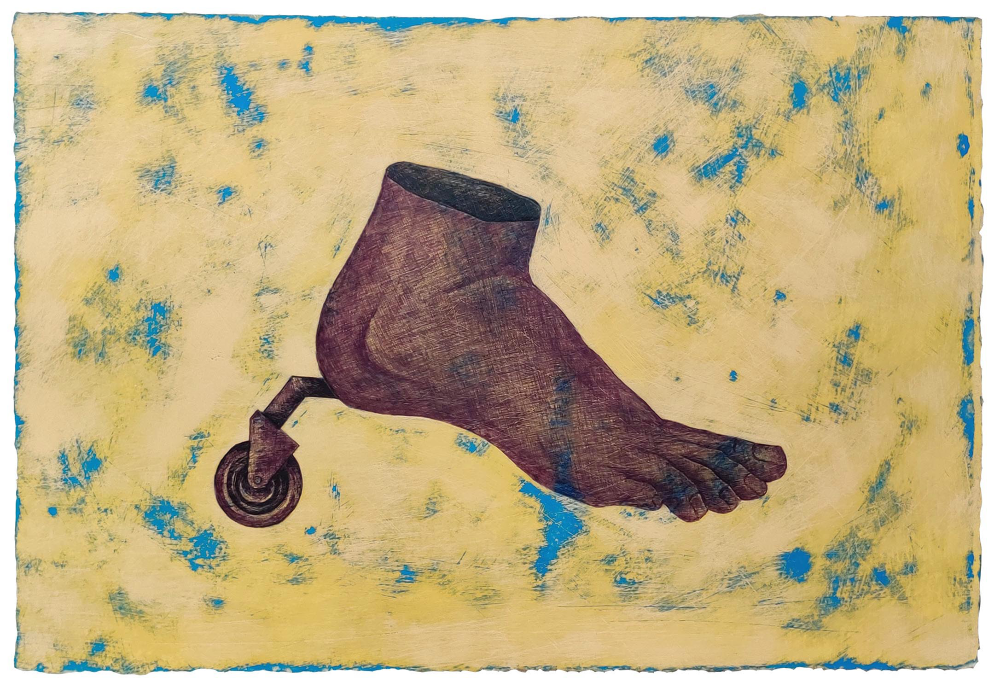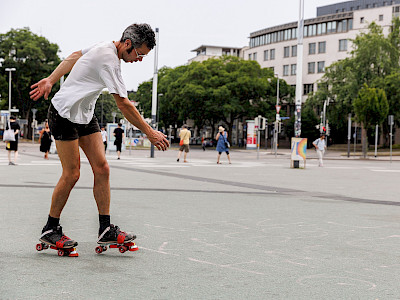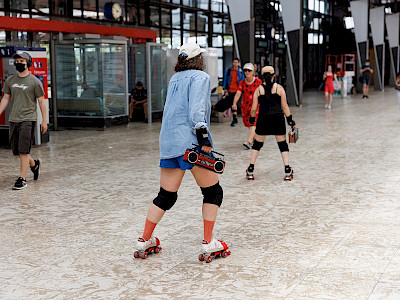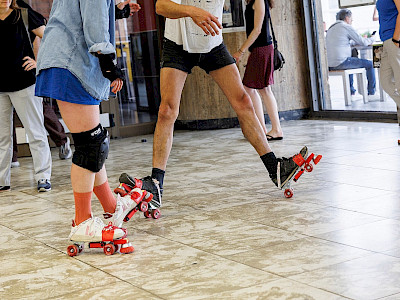11.05 — 03.06.2023
Amol K Patil Mumbai
Talking Sweepers / Black Masks on Roller Skates
durational performance / exhibition — premiere
Skate park Ursulines / Les Brigittines
Outdoor | Standing, no seating | Free
How can we reclaim public space for protest? What if we did it on roller skates? Amol K Patil is a performer and visual artist based in Mumbai. With an exceptionally refined practice of painting and sculpture, he creates a landscape of delicate images that evoke the precarity of working conditions. Inspired by labour songs collected decades ago by his father, he recently presented a series of performances employing roller skates equipped with cleaning brushes, with people carrying stereos around in public space playing songs that question the status of workers. The songs are rooted in an Indian protest tradition called powada, which dates back to the 17th century. Like rappers, the performers are unrestrained as they spit words that denounce social inequality. For his first project in Brussels, Amol K Patil takes residence in the Marolles, a historic social district of the inner city. He collaborates with local feminist skater collectives who move around its famous skate park. The first and last day of the festival, they infiltrate the public space with narratives of social struggle and surprise passers-by with a striking performance on roller skates. Amol K Patil’s visual work is presented in a small exhibition inside the Festival Centre.
AMOL K PATIL
Talking Sweepers
“My grandfather was an anti-colonial Powada performer who mixed his critique of empire with that of violence embedded in the graded inequality of the caste system that hierarchically divides not just labour but labourers.
Powada is a lyrical, musical performance often staged by travelling individuals. Powada can be traced back to the thirteenth century, when poets from kings’ courts would compose theatrical songs in praise of gods. In Maharashtra, the Dalit 1 movement has reinvented this tradition, turning its devotional bias into a radical idiom that confronts social issues and politically reimagines the structure of Indian society. With its long, revolutionary poems, it is also a political tool that redesigns what constitutes the Indian public.
For my installation, I build on the theatre and performa-tive traditions nested in working-class neighbourhoods in Mumbai, as well as my own family history. A friend of my father, Anil Tuebhekar, I remember, moved on skates, with a broom in his hand and radio at his waist, sweeping the street every day. He cleaned the city, but knew he was not welcome on the bus or in the hotel for a drink of water. To shut the world out with music was his individual protest. Followed by that individual protest, I designed kinetic skates that have a cleaning brush on them as a form of broom or cleaning tool.”
Amol K Patil
(from an interview with Elisabeth Dietz)
Amol K Patil’s exhibition during the Kunstenfestivaldesarts is a tribute to his father’s friend and a reflection on the dignity of work, and echoes the working-class history of the Marolles district. It encompasses a series of drawings, a video work and a set of sculptures.
In the series of 16 drawings Talking Sweepers (silkscreen prints, 2014), Amol K Patil inherited from his grandfather the spoken stories of B R Ambedkar, the thinker who gave India the way out of the caste system towards social equality. These found songs of protests, handwritten by his grandfather, provided Amol with impetus for a series of drawings in which the handwritten songs enter into dialogue with body parts and landscapes of labour.
The exhibition presents the video Black Masks on Roller Skates (video with sound, 10 min), for which Amol K Patil has created a set of roller skates equipped with a rotating brush. The action of crossing the public space in them with a stereo playing strike songs becomes a tribute to his father’s friend.
As a third element, the exhibition presents a series of new sculptures, created from objects purchased at the Jeu de Balle flea market, a few hundred metres from Les Brigittines, and covered in dust. Observing them, they seem linked to a labour activity or to the colonial imagi-nary; yet they are transformed – a common element of Patil’s practice. As after a strike, they have abandoned their function, they are rendered obsolete by a dust that covers their features, transforming them into artefacts.
The exhibition is conceived in a small display of objects in an almost domestic format. It is designed for a specific area of Les Brigittines, to be visible from the inside and outside, articulating a link with the public space, a central place in Patil’s practice.
The exhibition is accompanied by two performances in Les Ursulines skatepark, opening and closing the festival. For this, Amol K Patil collaborated with local skating collectives, La Patinerie, sharing with them the Powada history of song writing and the infiltration of political narratives into the city through roller skates. The participants wrote a series of responses, regarding new narratives that need to enter the public space and its occupation today; they will carry these narratives around the skatepark, with skates customised by Patil.
In an ideal axis between the skatepark, Les Brigittines and the Jeu de Balle square, the project traces the geography of the Marolles district and its central identity for the city’s working class history.
1 Dalit / Dalita, meaning “broken / scattered”, is a name for people belonging to the lowest stratum of the castes in India, previously characterised as “untouchable”. Dalits have had the lowest social status in the traditional Hindu social structure. Discrimination against Dalits has been observed across Southern Asia and among the South Asian diaspora. According to a 2007 report by Human Rights Watch (HRW), the treatment of Dalits has been like a “hidden apartheid” and they “endure segregation in housing, schools, and access to public services”. In rural India they still live in secluded quarters, do the dirtiest work and are not allowed to use the village well or other shared facilities.
A project by Amol K Patil | In collaboration with YALGAAR Sanskrutik Manch and Sachin Pitale | With a group of skaters
A first version of this project was created as a part of Documenta 15, curated by ruangrupa
In collaboration with Girls Make The City, a project by ZIJkant and Wetopia




